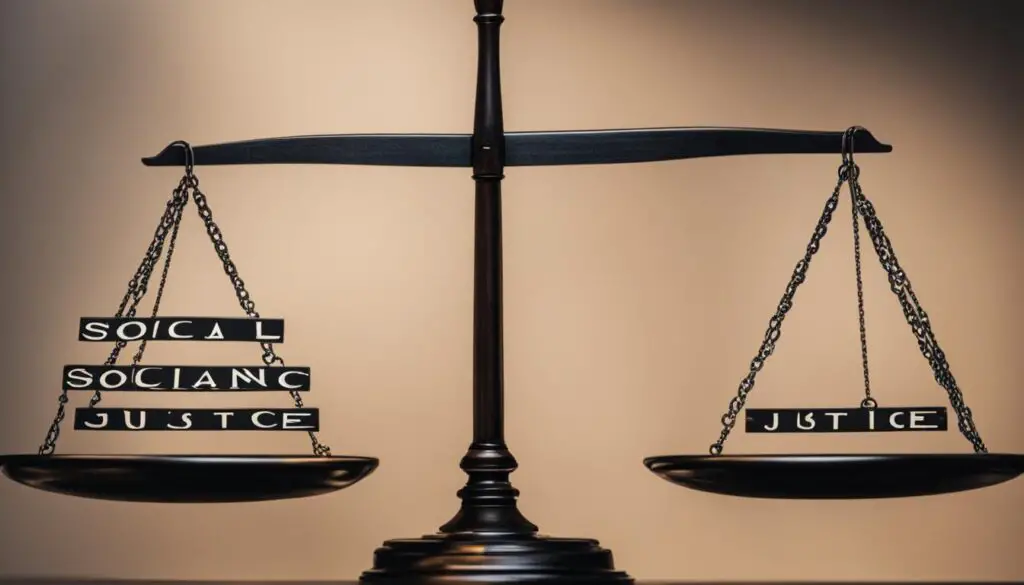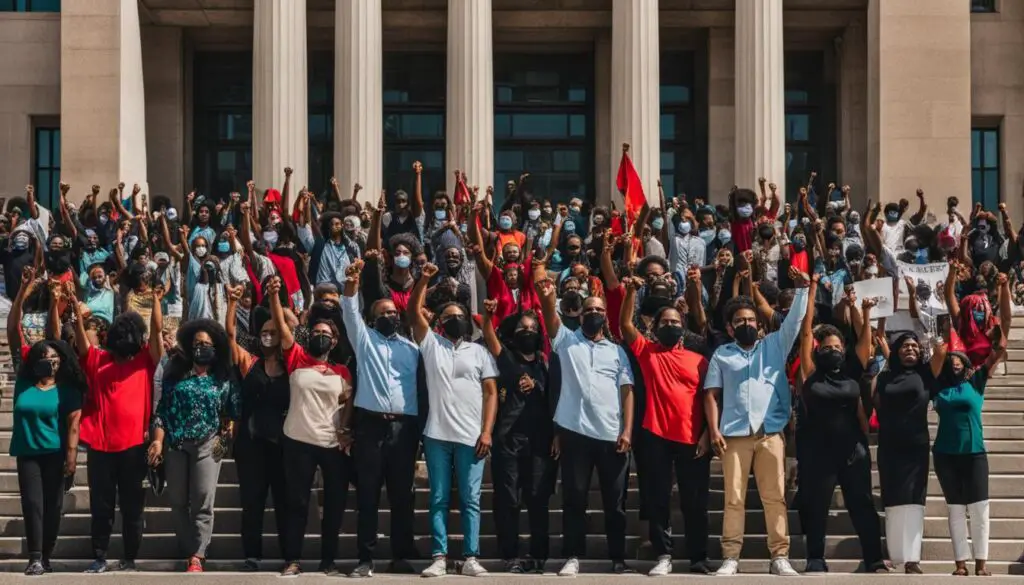This article delves into the impact that social justice and political thought have on shaping modern narratives. It examines how these concepts influence society, including the effects on equality, critical theory, intersectionality, activism, and policy change. By exploring the relationship between social justice and political thought, we can gain a deeper understanding of their significance in contemporary discourse.
Key Takeaways:
- Social justice and political thought shape modern narratives and influence society.
- Equality, critical theory, intersectionality, activism, and policy change are influenced by social justice and political thought.
- Understanding the relationship between social justice and political thought is crucial for a more just and equitable society.
- Social justice initiatives focus on addressing inequalities and improving the lives of marginalized groups.
- Intersectionality and critical theory play significant roles in promoting social justice and challenging oppressive systems.
The Concept of Social Justice
Social justice is a political and philosophical theory that focuses on fairness in society. It encompasses the belief that all individuals should have equal access to resources, opportunities, and social privileges. At its core, social justice seeks to address the disparities that exist within societies, including those related to wealth distribution, equal opportunity, and privileges.
The concept of social justice emerged in the 19th century as a response to the wide disparities in wealth and social standing that resulted from the social structure of that era. It aimed to rectify the unfairness and inequities experienced by marginalized groups. Today, social justice continues to play a crucial role in promoting equality and combating systemic disparities.
Key aspects of social justice include advocating for equal access to resources, ensuring equity in opportunities, and promoting diversity and inclusion. It also encompasses the protection of human rights for all individuals. By understanding the concept of social justice, we can work towards creating a more just and equitable society for all.
“The true measure of any society can be found in how it treats its most vulnerable members.” – Mahatma Gandhi
History and Evolution of Social Justice
The concept of social justice has a rich history that can be traced back to the Industrial Revolution. This period, characterized by rapid industrialization and urbanization, brought about significant social and economic changes. It also highlighted the stark disparities between the rich and the poor, leading to economic distress and exploitation of marginalized groups. As a response, social justice emerged as a political and philosophical theory aimed at creating more egalitarian societies and addressing these inequalities.
Initially, social justice focused on issues related to the distribution of capital, property, and wealth. Efforts were made to challenge the prevailing social structure and advocate for fairer wealth distribution and equal opportunities. However, over time, the concept of social justice expanded beyond these economic concerns and began to prioritize human rights and the overall well-being of marginalized and disadvantaged groups.
The evolution of social justice reflects society’s growing recognition of the complex and interconnected nature of social issues. It emphasizes the need to address various forms of inequality and discrimination, including those based on race, gender, sexuality, and class. Modern social justice movements strive to challenge systemic injustices and create a more inclusive and equitable society for all.

Key Milestones in the History of Social Justice
| Time Period | Milestones |
|---|---|
| 19th century | The emergence of social justice as a response to wealth disparities during the Industrial Revolution. |
| 20th century |
– Expansion of social justice to prioritize human rights and address inequality based on race, gender, sexuality, and class. – Civil rights movements and advocacy for equality and justice for marginalized groups. – Formation of international organizations focused on social justice, such as the United Nations and its Universal Declaration of Human Rights. |
| 21st century |
– Intersectionality gaining recognition as a key component of social justice. – Rise of social justice movements advocating for policy changes and challenging systemic injustices. – Increased emphasis on inclusivity and diversity in social justice discourse. |
Social Justice and the Government
Social justice is not just a concept championed by activists and advocates; it also requires the active involvement of government entities, non-profit organizations, and administrative bodies to implement policies that promote equality and fairness in society. These organizations play a crucial role in shaping public policies, ensuring that social justice issues are given due consideration and addressing the needs of marginalized and disadvantaged groups.
Government institutions have the power to create meaningful change through social justice initiatives. They have the authority to allocate resources, redistribute wealth, and provide legal protections that can help level the playing field for all individuals. Non-profit organizations also contribute to social justice by advocating for policy changes and providing support services to those in need.
Political influence plays a significant role in the extent to which social justice is prioritized in governmental actions. Administrators and policymakers must consider the impact of their decisions on marginalized communities and the overall goal of creating a more equitable society. By taking into account the principles of social justice, governments can work towards dismantling systemic barriers and addressing the root causes of inequality.
| Government Role in Social Justice | Non-Profit Organizations and Social Justice |
|---|---|
| Implementing social justice policies | Advocating for policy changes |
| Allocating resources | Providing support services |
| Redistributing wealth | Addressing the needs of marginalized groups |
| Ensuring legal protections | Raising awareness |
Together, social justice movements, government entities, and non-profit organizations can work towards creating a society that values equality, fairness, and justice for all. By collaborating and prioritizing the needs of marginalized communities, we can strive for a more inclusive and equitable future.
Five Principles of Social Justice
Social justice is grounded in five key principles that guide its practice and implementation. These principles provide a framework for understanding and addressing the inequalities and inequities present in our society. By adhering to these principles, we can work towards a more just and equitable world.
1. Access to Resources
The principle of access to resources emphasizes the importance of equal opportunities and services for all individuals in society. It recognizes that disparities in access to resources can perpetuate inequality and hinder social mobility. By ensuring that everyone has equitable access to education, healthcare, housing, and other essential resources, we can create a more level playing field and reduce systemic barriers.
2. Equity
Equity is a crucial principle of social justice that centers on providing individuals with the tools and support they need to thrive based on their specific circumstances. It recognizes that different people have different needs and that treating everyone the same does not always lead to fairness. Achieving equity involves considering the unique challenges faced by marginalized and disadvantaged groups and tailoring solutions to address their specific needs.
3. Participation
Participation is a principle that emphasizes the importance of including all individuals in decision-making processes that affect their lives. It recognizes that marginalized communities have historically been excluded from power structures and decision-making processes. By actively involving individuals and communities in shaping policies and practices, we can ensure that diverse perspectives are heard, valued, and considered.
4. Diversity
The principle of diversity acknowledges the value of different cultural perspectives, experiences, and identities. It recognizes that a diverse society is a rich and vibrant one, and that embracing diversity leads to greater innovation, understanding, and social cohesion. By promoting inclusivity and combating discrimination, we can create environments that celebrate and respect the diverse identities and lived experiences of all individuals.
5. Human Rights
Human rights are fundamental to social justice. This principle ensures that individuals are protected and guaranteed their civil, economic, and political rights. It acknowledges that every person should be treated with dignity, respect, and equality. By upholding and advocating for human rights, we can create a society that values and protects the rights of all individuals, regardless of their background or circumstances.
These five principles provide a solid foundation for understanding and promoting social justice. By incorporating these principles into our policies, practices, and everyday actions, we can work towards creating a more just, equitable, and inclusive society.
Social Justice in Political Thought
Social justice is a concept deeply intertwined with political thought and ethics. It is through the lens of political ideologies and ethical frameworks that social justice is examined, evaluated, and advocated for. Political thought provides a platform for analyzing power dynamics, understanding the complexities of oppression, and exploring strategies for social change.
Ethics, as a branch of philosophy, guides the principles and values that underpin social justice. It delves into questions of fairness, equality, and the distribution of resources. Political thought, on the other hand, encompasses a broad range of theories that explore the relationship between the individual and society, as well as the role of government and institutions in addressing social inequities.
Within the realm of political action and advocacy, social justice is often at the forefront. Individuals who champion social justice recognize the need for systemic change and work to challenge existing power structures that perpetuate inequality. They engage in various forms of political activism, such as lobbying for policy reforms, organizing protests, and raising awareness about social justice issues.
Ethics and Social Justice
Ethics plays a fundamental role in discussions around social justice. It provides a framework for evaluating the moral implications of social inequalities and shaping strategies for addressing them. Ethical theories such as utilitarianism, deontology, and virtue ethics offer different perspectives on how to achieve social justice and guide individuals in making ethical decisions in pursuit of a more just society.
Political Thought and Social Justice Movements
Political thought serves as a source of inspiration and motivation for social justice movements. Different political ideologies offer unique approaches to addressing social injustices, whether through advocating for economic equality, challenging systemic discrimination, or promoting social welfare programs. By engaging with political thought, activists can articulate their goals, mobilize supporters, and develop strategies for effecting meaningful change.
| Table: Key Concepts in Political Thought and Social Justice | |
|---|---|
| Concept | Description |
| Liberalism | An ideology that emphasizes individual rights, political freedom, and limited government intervention to promote social justice. |
| Marxism | A theory that focuses on class struggle and advocates for economic equality and the abolition of private property. |
| Feminism | A movement that seeks gender equality and challenges patriarchal systems that perpetuate gender-based discrimination. |
| Postcolonialism | A critical perspective that examines the legacies of colonialism and the oppression of marginalized groups in postcolonial societies. |
| Intersectionality | An approach that recognizes the interconnected nature of social identities and the unique forms of oppression faced by individuals with intersecting identities. |
Political thought and social justice are deeply intertwined. The exploration and understanding of political ideologies and ethical frameworks are instrumental in shaping social justice movements, fostering discussions around inequality, and envisioning a more just and equitable future.

Impact on Social Justice and the Lives of Disadvantaged Groups
Social justice initiatives have a profound impact on the lives of disadvantaged groups, addressing the discrimination, inequality, and economic distress that they face on a daily basis. These initiatives strive to create a more equitable society through activism and policy changes.
Disadvantaged groups, such as racial minorities, women, LGBTQ+ individuals, and people with disabilities, experience various forms of discrimination that limit their access to equal opportunities and resources. Social justice movements, driven by passionate activists, aim to dismantle these barriers and challenge systemic oppression.
Through activism, social justice movements bring awareness to the issues faced by disadvantaged groups and mobilize for policy change. They advocate for the implementation of laws and regulations that promote equality, protect civil rights, and provide support for marginalized communities.
For example, in the fight against racial discrimination, social justice movements have played a pivotal role in advancing civil rights and dismantling segregation. The Civil Rights Movement in the United States, led by activists such as Martin Luther King Jr., successfully pushed for policy changes that outlawed racial segregation and protected the rights of African Americans.
| Social Justice Impact | Disadvantaged Groups | Examples of Activism and Policy Change |
|---|---|---|
| Addressing discrimination | Racial minorities, Women, LGBTQ+ individuals, People with disabilities | Advocacy for anti-discrimination laws and policies, promoting diversity and inclusion |
| Tackling inequality | Low-income individuals, Working-class communities | Fighting for fair wages, affordable housing, and access to education |
| Alleviating economic distress | Unemployed individuals, Homeless populations | Campaigning for social safety nets, job training programs, and affordable healthcare |
“Injustice anywhere is a threat to justice everywhere.” – Martin Luther King Jr.
By understanding the impact of social justice on the lives of disadvantaged groups, we can continue to support and engage in activism that promotes equality and social change. Policy changes driven by social justice movements have the potential to create a more inclusive society, where everyone has the opportunity to thrive.

Intersectionality and Social Justice
Intersectionality is a crucial aspect of social justice that recognizes the interconnected nature of different forms of discrimination and oppression. It acknowledges that individuals can face multiple disadvantages due to their intersecting identities, such as race, gender, sexuality, and class. By understanding the complex ways in which these diverse identities intersect, social justice movements can better address the overlapping oppressions that marginalized groups face.
“Intersectionality is not about the basic unit of identity, but rather about how our many identities and experiences compound and interact to create unique modes of discrimination and privilege.”
By considering the various dimensions of identity and oppression, social justice efforts can work towards systemic change. This requires recognizing and challenging deep-rooted structures and systems that perpetuate inequality. It involves advocating for policies and interventions that address the specific needs and experiences of different groups, rather than adopting a one-size-fits-all approach.
Creating systemic change requires a multifaceted approach that goes beyond addressing surface-level disparities. It involves dismantling the structural barriers and systems that perpetuate inequality and privilege certain groups over others. This may include advocating for policy changes that address discriminatory practices, implementing inclusive education and employment practices, and promoting diverse representation in decision-making processes. By centering intersectionality in social justice efforts, we can work towards a more equitable and inclusive society for all.
Table: Intersections of Social Injustices
| Intersecting Identities | Forms of Discrimination and Oppression | Examples |
|---|---|---|
| Race + Gender | Sexism, racism, gendered racism | Black women facing gendered racism in the workplace |
| Sexuality + Disability | Heterosexism, ableism | Disabled LGBTQ+ individuals facing discrimination and lack of access to healthcare |
| Class + Immigration Status | Classism, xenophobia | Low-income immigrants facing economic disparities and anti-immigrant sentiment |
Critical Theory and Social Justice
Critical theory plays a significant role in understanding and advancing social justice. It provides a framework for analyzing power dynamics and societal structures that perpetuate oppression. By questioning dominant narratives and systems, critical theory aims to bring about social change and promote a more equitable society. The intersection of critical theory and social justice enables a deeper understanding of the mechanisms that contribute to inequality and offers insights into potential avenues for transformation.
“Critical theory helps us uncover the hidden power structures that shape our society,” says Dr. Maria Ramirez, a professor of Sociology. “By examining the intersections of race, gender, class, and other identities, we gain a clearer understanding of how oppression operates and can work towards dismantling it.”
Through critical analysis and challenging existing systems, critical theory encourages individuals and communities to question and challenge power dynamics. It highlights the importance of recognizing and challenging oppressive structures that perpetuate inequality. By promoting social change at both the individual and systemic levels, critical theory contributes to the pursuit of social justice.
The Role of Critical Theory in Promoting Social Change
Critical theory provides a lens through which individuals and communities can identify and critique social inequalities. By understanding the underlying power dynamics that contribute to oppression, critical theory empowers individuals to advocate for social change and challenge the status quo. It encourages individuals to question and challenge dominant narratives and structures that perpetuate inequality and discrimination.
Moreover, critical theory fosters a deeper understanding of the importance of solidarity and collective action in achieving social justice. It emphasizes the need for individuals from diverse backgrounds to come together and work towards dismantling oppressive systems collaboratively. By recognizing the interconnectedness of social issues, critical theory encourages individuals to engage in meaningful dialogue and forge alliances in the pursuit of social change.

“The emancipation of society from oppression requires the active participation of individuals who understand the power dynamics at play,” says Dr. Sarah Thompson, a social justice advocate. “Critical theory equips individuals with the analytical tools needed to identify and challenge oppressive systems, fostering a more inclusive and equitable society.”
Activism and Policy Change
Activism plays a vital role in driving social justice movements and advocating for policy change. Through grassroots efforts, passionate activists raise public awareness about pressing social issues and push for tangible improvements in our society. By organizing protests, marches, and campaigns, they put pressure on policymakers and demand policy reforms that address systemic inequalities and promote a more just and equitable society.
One of the key objectives of activism is to challenge existing power structures and bring about meaningful policy change. Activists often collaborate with like-minded organizations and individuals, forming powerful coalitions that amplify their voices and maximize their impact. By mobilizing communities, engaging in public debates, and presenting compelling arguments, activists can influence policymakers to adopt new legislation or revise existing policies to better align with the principles of social justice.
“Never doubt that a small group of thoughtful, committed citizens can change the world; indeed, it’s the only thing that ever has.” – Margaret Mead
Activism also fosters public awareness and understanding of social justice issues. By highlighting the lived experiences of marginalized communities, activists shed light on the injustices they face and inspire empathy and solidarity among the wider population. This increased awareness can lead to broader public support for policy change and create a momentum that propels social justice movements forward.
The Power of Advocacy
Advocacy is a central component of activism that involves representing and voicing the needs and interests of marginalized groups. Advocates work tirelessly to bring attention to specific social justice issues and ensure that affected communities are included in policy discussions and decision-making processes. Through advocacy, activists exert pressure on policymakers, urging them to prioritize social justice and enact comprehensive policy changes that address the root causes of inequality and discrimination.
Ultimately, activism and policy change go hand in hand, driving progress and creating lasting social impact. By mobilizing communities, shaping public opinion, and advocating for policy reforms, activists play a crucial role in advancing the cause of social justice and working towards a more equitable and inclusive society.

Social Justice and Democracy
Social justice and democracy are closely intertwined, with democratic governance providing a platform for addressing social justice issues and fostering a more inclusive society. Within democratic systems, political parties play a significant role in integrating social justice concerns into policy agendas. By incorporating social justice principles into their platforms, left-leaning political parties aim to promote equality, fairness, and the well-being of marginalized communities.
Democratic governance allows for the integration of social justice policies, ensuring that the voices and needs of disadvantaged groups are acknowledged and addressed. Through policy integration, democratic systems strive to create a more equitable society by reducing inequality and promoting social cohesion. By engaging in democratic processes, individuals and communities can advocate for policy changes that align with the goals of social justice.
Table:
| Political Party | Social Justice Platform |
|---|---|
| Progressive Party | Promotes wealth redistribution to address income inequality |
| Green Party | Advocates for environmental justice and sustainability |
| Socialist Party | Calls for worker rights and social welfare programs |
It is through the democratic process that individuals can actively participate in shaping policy agendas and advocating for policies that prioritize social justice. By exercising their right to vote and engaging in political activism, citizens can contribute to the creation of a more just and equitable society.
In summary, social justice and democracy are interconnected, with democratic governance providing an avenue for addressing social justice concerns and promoting equality. By integrating social justice principles into political platforms and policy agendas, democratic systems strive to reduce inequality and create a more inclusive society. Active participation in the democratic process allows individuals to advocate for policy changes that align with the goals of social justice, ultimately leading to a fairer and more equitable world.
Conclusion
The impact of social justice on political thought and society is profound. By understanding the key principles of social justice, appreciating the importance of intersectionality, recognizing the power of activism, and embracing the connection between social justice and democracy, we can strive towards creating a more just and equitable world.
Social justice plays a crucial role in shaping modern narratives and driving policy changes. Its influence extends to issues of equality, critical theory, intersectionality, activism, and policy reform. By exploring the relationship between social justice and political thought, we gain a deeper understanding of their significance in contemporary discourse.
Key principles such as access to resources, equity, participation, diversity, and human rights form the foundation of social justice. These principles serve as guiding principles for creating a fair and inclusive society where everyone has equal opportunities and protections.
Moreover, intersectionality, which acknowledges the interconnected nature of different forms of discrimination and oppression, is vital for achieving meaningful and lasting change. It recognizes that individuals can face multiple disadvantages due to their intersecting identities, and addressing overlapping oppressions is essential in creating a more equitable society.
Activism acts as a catalyst for social justice, raising awareness, advocating for policy changes, and demanding progress. Social justice movements, driven by passionate activists, have the power to bring about tangible improvements in social justice issues and shape a more just and equitable society.
In a democratic society, social justice and democracy are intertwined. Left-leaning political parties often incorporate social justice issues into their platforms, and democratic governance allows for policy integration that addresses social justice concerns. By fostering a close relationship between social justice and democracy, we can strive for policy agendas that promote equality and fairness.
As social justice continues to shape modern narratives and influence policy changes, its significance remains undeniable. By actively engaging with the principles of social justice, embracing intersectionality, supporting activism, and valuing the connection between social justice and democracy, we can work towards creating a society that upholds the values of equality, justice, and fairness for all.
FAQ
What is social justice?
Social justice is a political and philosophical theory that focuses on fairness in society, including equal access to wealth, opportunities, and social privileges.
How does social justice impact society?
Social justice initiatives aim to address discrimination, inequality, and economic distress that affect marginalized individuals and communities, leading to greater awareness, legal protections, and improved opportunities for these groups.
What is intersectionality in relation to social justice?
Intersectionality recognizes that individuals can face multiple disadvantages due to their intersecting identities (such as race, gender, sexuality, and class), and it emphasizes addressing overlapping oppressions to achieve systemic change and a more equitable society.
What is the role of critical theory in social justice?
Critical theory examines power dynamics and societal structures that perpetuate oppression, aiming to bring about social change and promote social justice by challenging dominant narratives.
How does activism contribute to social justice?
Activism plays a crucial role in raising awareness, advocating for policy changes, and driving societal transformation, leading to tangible improvements in social justice issues and creating a more just and equitable society.
What is the connection between social justice and democracy?
Social justice issues are often incorporated into the platforms of left-leaning political parties within democratic systems. Democratic governance allows for policy integration that addresses social justice concerns and fosters a more inclusive society.
What are the key principles of social justice?
The key principles of social justice are access to resources, equity, participation, diversity, and human rights.
How does social justice influence government policies?
While activists and advocates have a significant impact on promoting social justice, government entities, non-profit organizations, and administrative bodies are responsible for implementing social justice policies, shaping public policies that address social justice issues.
How has social justice evolved over time?
Social justice initially focused on issues related to the distribution of capital, property, and wealth. Over time, it has evolved to prioritize human rights and improving the lives of marginalized and disadvantaged groups.
What is the relationship between social justice and political thought?
Social justice is closely tied to political thought and ethics, with social workers, for example, having a duty to challenge social injustice and promote social values compatible with social justice.
















